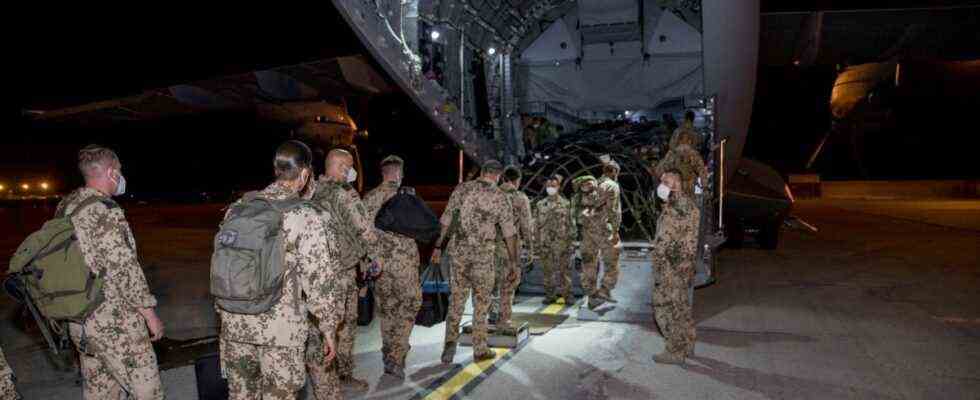For security reasons, the Bundeswehr kept the date a secret until the end: the last German transport machine with material and soldiers left Afghanistan late on Tuesday evening. She was expected in Germany on Wednesday morning. After almost 20 years, the Bundeswehr’s mission in Afghanistan ends.
The one remaining military field camp, Camp Marmal near Mazar-i-Sharif in the north of the country, has been handed over to the Afghan armed forces. Almost 20 soldiers from the Special Forces Command (KSK) secured the withdrawal and then boarded the last machine that took off from the city’s airfield. Most recently, up to 1,300 soldiers were regularly stationed in Afghanistan. In the NATO mission “Resolute Support” they were tasked with putting the Afghan armed forces in a position to defend the country themselves. The total cost of the mission is around 13 billion euros.
This is the end of the most loss-making and most strenuous foreign deployment for the Bundeswehr. Almost 160,000 soldiers were deployed in the Hindu Kush, 59 died there. Quite a few were wounded in action.
Defense Minister Annegret Kramp-Karrenbauer (CDU) said on Tuesday evening: “A historic chapter is coming to an end, an intensive mission that has challenged and shaped the Bundeswehr, and in which the Bundeswehr has proven itself in combat.” Bundestag President Wolfgang Schäuble (CDU) said in the last week of the plenary session of this legislature: “The experiences in the Hindu Kush teach us humility to be more cautious in our expectations and in assessing our possibilities.”
A whole generation of young soldiers was deployed there, and the Bundeswehr has changed that profoundly. Until 2014, this was a combat mission mandated by the UN as part of the NATO-led international protection force ISAF. The Germans were the leading nation in the north, which remained relatively calm in the first few years.
From 2006 onwards, attacks by the Taliban increased, for which the Bundeswehr was not well prepared, both materially and psychologically. The Kunduz military camp became a symbol of the crisis, where the German operation reached its lowest point in 2009, when an air strike ordered by the German Armed Forces killed numerous civilians as well as the Taliban. It was not until 2010/11 that the insurgents were weakened and pushed back.
It is quite possible that the Taliban will return to power
But then the end of the combat mission, which US President Barack Obama wanted to end, was approaching. The time had come in 2014. The ISAF was followed by the training mission “Resolute Support” (RS), which was supposed to enable the Afghan security forces to protect the country against the Taliban on their own. However, these are now on the advance and have recently conquered several districts.
The final withdrawal goes back to the then US President Donald Trump, who wanted to bring the US troops home and negotiated a peace agreement with the Taliban in 2020 without the participation of the Afghan government. His successor Joe Biden was faced with the choice of suspending this hasty agreement that favored the Taliban and thus risking a new escalation or ending the mission, which had almost expired. He chose the second solution. Since the mission stood and fell with the US troops, the NATO Council decided on April 14, 2021 the final withdrawal of the troops.
The last foreign soldiers are said to have left the country by September 11th at the latest. It is the 20th anniversary of the Islamist terrorist attacks in New York and Washington. They were on account of al-Qaeda, which had found a safe haven in the Taliban’s Afghanistan, and ultimately triggered the war in Afghanistan. It is now possible that the Taliban will return to power.

